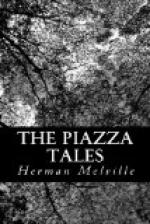“With a rusty dagger-fragment in one hand, and a bit of a wine-jar in another, I sat me down on the ruinous green sofa I have spoken of, and bethought me long and deeply of these same Buccaneers. Could it be possible, that they robbed and murdered one day, reveled the next, and rested themselves by turning meditative philosophers, rural poets, and seat-builders on the third? Not very improbable, after all. For consider the vacillations of a man. Still, strange as it may seem, I must also abide by the more charitable thought; namely, that among these adventurers were some gentlemanly, companionable souls, capable of genuine tranquillity and virtue.”
* * * * *
SKETCH SEVENTH.
CHARLES’S ISLE AND THE DOG-KING.
—So with outragious cry,
A thousand villeins round about him swarmed
Out of the rocks and caves adjoining nye;
Vile caitive wretches, ragged, rude, deformed;
All threatning death, all in straunge manner armed;
Some with unweldy clubs, some with long speares.
Some rusty knives, some staves in fier warmd.
* * * * *
We will not be of any occupation,
Let such vile vassals, born to base vocation,
Drudge in the world, and for their living droyle,
Which have no wit to live withouten toyle.
Southwest of Barrington lies Charles’s Isle. And hereby hangs a history which I gathered long ago from a shipmate learned in all the lore of outlandish life.
During the successful revolt of the Spanish provinces from Old Spain, there fought on behalf of Peru a certain Creole adventurer from Cuba, who, by his bravery and good fortune, at length advanced himself to high rank in the patriot army. The war being ended, Peru found itself like many valorous gentlemen, free and independent enough, but with few shot in the locker. In other words, Peru had not wherewithal to pay off its troops. But the Creole—I forget his name—volunteered to take his pay in lands. So they told him he might have his pick of the Enchanted Isles, which were then, as they still remain, the nominal appanage of Peru. The soldier straightway embarks thither, explores the group, returns to Callao, and says he will take a deed of Charles’s Isle. Moreover, this deed must stipulate that thenceforth Charles’s Isle is not only the sole property of the Creole, but is forever free of Peru, even as Peru of Spain. To be short, this adventurer procures himself to be made in effect Supreme Lord of the Island, one of the princes of the powers of the earth.[A]
[Footnote A: The American Spaniards have long been in the habit of making presents of islands to deserving individuals. The pilot Juan Fernandez procured a deed of the isle named after him, and for some years resided there before Selkirk came. It is supposed, however, that he eventually contracted the blues upon his princely property, for after a time he returned to the main, and as report goes, became a very garrulous barber in the city of Lima.]




